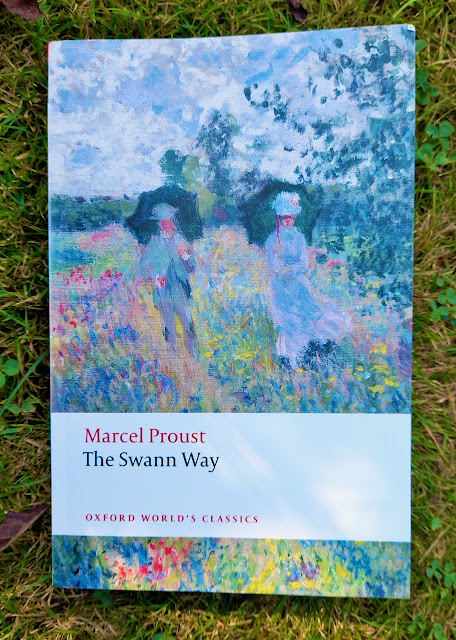I recommend very highly for anyone who has read or not read In Search of Lost Time Brian Nelson's The Swann Way, the first volume in a new translation of the entire novel by diverse hands, in this fine and very affordable paperback from Oxford World's Classics. His translation of the chapter Swann in Love, a novel in itself more or less, was published separately in 2017, so this edition includes Combray and Place Names: The Name.
This is the fourth translation of Du côté de chez Swann following Scott Moncrieff/Kilmartin, James Grieve's, and Lydia Davis', and the third version of the title. It's a pity (no doubt for publishing reasons) they can't all be Swann's Way, as the flow of the two esses and double double-u into the final wye has the mellifluous quality of Proust's prose.
I don't have any French (not since the ransom was paid anyway), so I can't judge it as a translation, but reading this version was like rediscovering Proust, puffing away the dust of Great Literature. I found the narrative clearer, the scenes funnier, the characters more distinctive – Aunt Léonie, Dr Cottard, Swann and Odette in particular – and the existential pressure of perception closer to the surface. And Proust's study of Swann's jealousy – "the shadow of his love" for Odette – is simply breathtaking.
Over the years I've written about Proust, most of it (like this) bookchat ephemera, but here, bar the final one, is a short list of longer, more in-depth posts:
Extratemporal meditations, on Miguel de Beistegui's Proust as Philosopher.
Encountering the fabulous point, indirectly on Józef Czapski's Lost Time: Lectures on Proust in a Soviet Prison Camp.
When now? on Gerard Genette's Narrative Discourse.
Can there be a pure narrative? is also the question opening Blanchot's essay The Experience of Proust, not included in selected bibliography for The Swann Way despite it being undoubtedly the best essay on Proust's novel and Brian Nelson having edited Leslie Hill's After Blanchot.
Perhaps most enjoyably, Albertine Asleep, my recording of a reading of a passage from The Captive broadcast in the early hours of the morning on the BBC World Service in 1978 that marks my discovery of Proust. It also includes the word mellifluous.
And talking of my discovery of Proust: a few years after the radio broadcast, I watched the Channel 4 series The Modern World: Ten Great Writers, which also had a huge impact on me, if only then of atmosphere. In the episode below Terence Kilmartin says that Proust is the most intelligent man who ever wrote a novel (obviously, this was long before Tony Parsons). The episode also features Michel Butor.Finally, if we needed a guarantee of equal quality for the second volume, Charlotte Mandell's name would be enough, and the good news is that I understand her translation is due in 2024 [update: March 2025. I have now written about volume two].




No comments:
Post a Comment